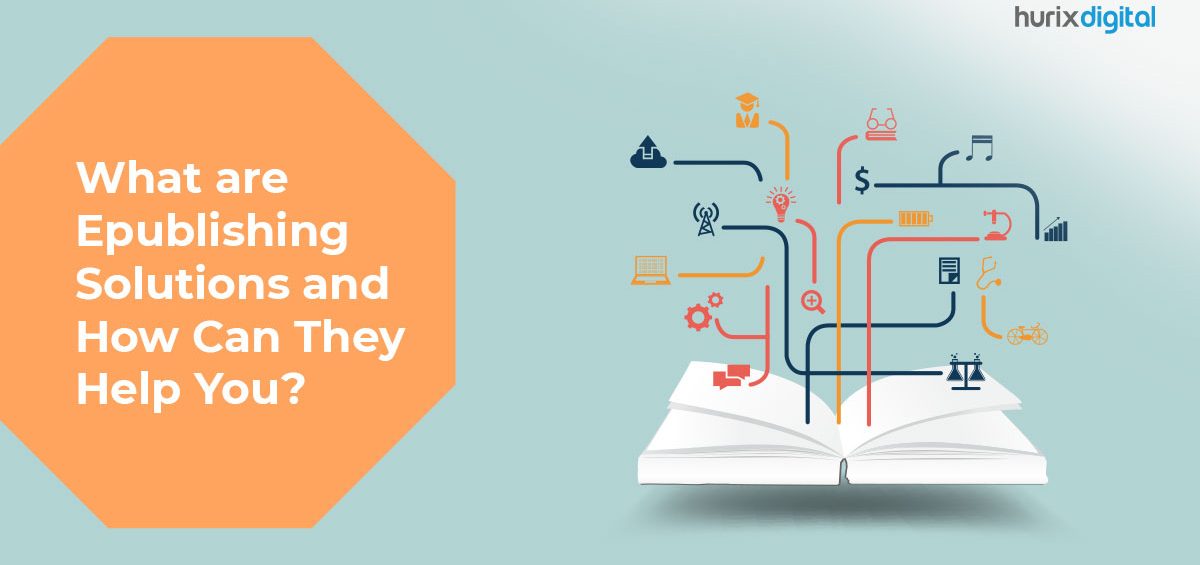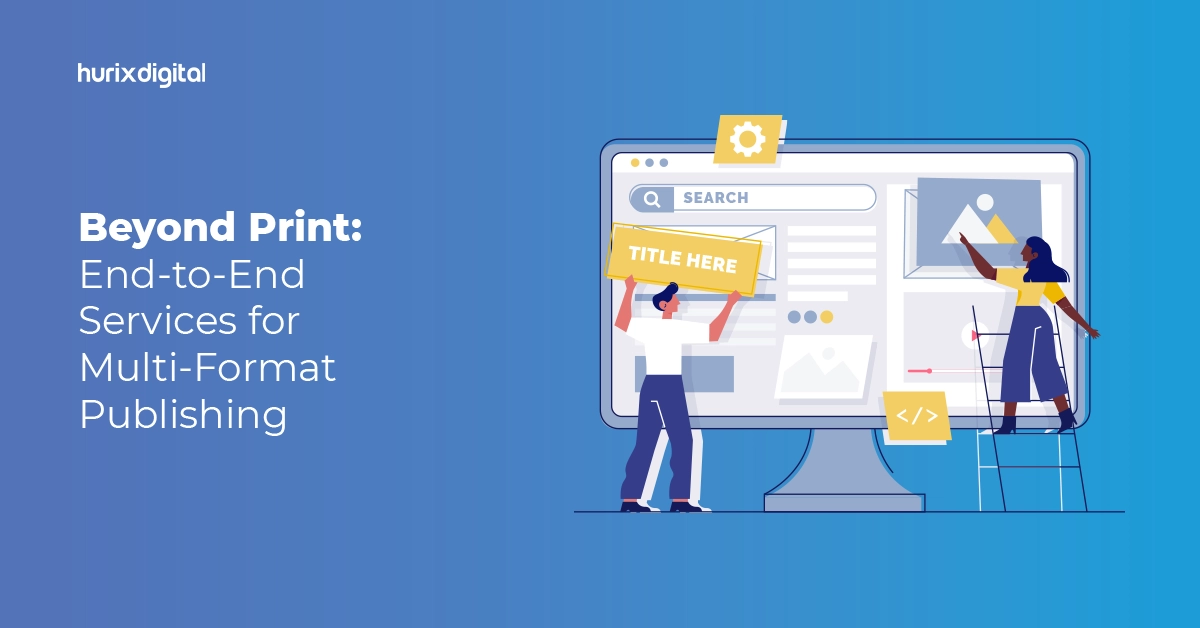Summary
Explore the world of e-Publishing solutions in our enlightening blog. Discover the versatility and advantages of digital publishing platforms for authors and businesses alike. From streamlined distribution to interactive content, learn how e-Publishing solutions can revolutionize your publishing journey. Unlock new possibilities and reach broader audiences with ease!
The publishing world has evolved significantly in recent years, with the rise of digital publishing and the shift towards online content consumption. Today, eBooks are set to reach a volume of $14.21 billion in 2023, and the number of eBook readers is growing, expected to reach 1557 million by 2027.
As a result, many writers and publishers are shifting to ePublishing to reach their target audience. However, this segment is not without challenges and requires the right experience and expertise to succeed.
ePublishing solutions can help make this path a lot smoother. With their advanced platforms, software, and tools, these solutions offer publishers a wide range of benefits, including increased efficiency, cost-effectiveness, and expanded reach.
In this article, we will explore the world of ePublishing, discuss what they are, how they can help publishers and authors, and the factors you need to consider when considering this provider.
Table of Contents:
- What is ePublishing Solutions?
- What are the Typical Challenges in ePublishing Solutions?
- How Can ePublishing Solutions Help You Tackle These Issues?
- What are the Key Factors When Choosing ePublishing Solutions?
- Conclusion
What is ePublishing Solutions?
e-Publishing solutions are a range of digital tools, platforms, and software that enable publishers to create, manage, and distribute content online. These solutions are designed to help publishers streamline their publishing process, reduce costs, and reach a wider audience.
These solutions can encompass a variety of tools and technologies, including
- digital asset management systems
- content management systems
- online publishing platforms
- digital rights management systems, and more.
This can also include converting printed content into digital formats like eBooks, eJournals, digital magazines, and other formats.
What are the Typical Challenges in e-Publishing Solutions?
While ePublishing has revolutionized the publishing industry, it is not without challenges. Here are some typical challenges publishers may face when converting their copies into digital formats.
1. Compatibility Issues
One of the biggest challenges in the ePublishing market is ensuring that digital content is compatible with various devices and platforms.
Different devices and platforms may have different technical requirements, file formats, and display options. This can impact the user experience and make it difficult for publishers to reach their target audience.
2. Security Concerns
Digital content is vulnerable to piracy, hacking, and unauthorized distribution, which can impact the revenue and reputation of publishers.
ePublishing platforms must implement robust security measures to protect digital content from theft and illegal duplication.
3. Monetization Challenges
While the solutions offer cost-effective distribution options, monetizing digital content can be challenging.
Readers have grown accustomed to free or low-cost digital content, which can make it difficult for publishers to generate revenue from their content.
4. Changing Reader Preferences
The ePublishing market constantly evolves, and publishers must keep up with changing reader preferences and behavior.
This can include changes in content consumption habits, device usage, and preferred content formats.
How Can ePublishing Solutions Help You Tackle These Issues?
ePublishing platforms offer a range of tools and technologies that can help publishers tackle the challenges in the ePublishing market.
Here are some ways that ePublishing solutions help writers and publishers in taking their content to the market.
1. Offer Conversion Tools To Support Multiple Formats
ePublishers can provide tools to ensure digital content is compatible with various devices and platforms.
For example, if the converted digital copy is in XML format, it can be read only on particular devices and software. It is only when you convert XML to ePUB format that it becomes available for a variety of devices and platforms.
2. Data Theft and Piracy Protection
ePublishers can implement robust security measures to protect digital content from piracy and unauthorized access. This can include digital rights management (DRM) systems, watermarking, and encryption.
3. Analytics and Monetization Options
e-Publishing services can offer various monetization options to market digital content, such as subscription-based models, pay-per-view models, and advertising.
They also provide tools to help publishers track and analyze their revenue streams on different platforms, helping them understand exactly which are their top revenue generators.
4. Ensures Timely Content Upgradation
Digital publication providers can help publishers keep up with changing reader preferences by providing tools to create and distribute content in different formats, such as eBooks, eJournals, and digital magazines.
They can also provide data and insights on reader behavior and engagement, enabling publishers to tailor their content offerings to meet the needs and preferences of their audience.
5. Provides Quality Checks
To ensure your content is presented per quality standards on multiple devices and platforms, you also get additional services, such as
- automated quality checks
- style and consistency guides
- accessibility checks
- editorial formatting
By providing these quality check features, ePublishing solutions can help publishers ensure that their digital content is high quality, error-free, and meets the needs and expectations of their readers.
What are the Key Factors When Choosing ePublishing Solutions?
Now to the main question, how do you choose an e-Publishing solutions for your needs? While there are several checks and factors at play, here are a few key points to look at:
- Cost: Consider the pricing structure of the ePublishing software and whether it fits within your budget. Some solutions may charge based on usage, while others may require a monthly or yearly subscription fee.
- Scalability: Check whether the solution can scale to accommodate your growing publishing needs over time.
- User interface and ease of use: Look for an ePublisher tool that is user-friendly and easy to navigate, especially if you have limited technical expertise.
- Analytics and reporting: Consider whether the solution provides analytics and reporting tools that can help you track the performance of your digital content and make data-driven decisions.
- Reputation and reviews: Research the reputation of the solution provider and read reviews from other publishers to assess their level of customer satisfaction and quality of service.
Additionally, you can also use this guide to ask the top 5 questions when choosing digital publishing tools to help you make the right decision.
Conclusion
ePublishing solutions offer a range of benefits for publishers looking to optimize their digital content and reach wider audiences. By leveraging these solutions, publishers can address common challenges such as content formatting, distribution, and accessibility.
Moreover, these solutions can also streamline the publishing process, reduce costs, and improve the quality of digital content.
If you want a solution to convert your existing content into digital formats, you can opt for an ePublishing solution like Hurix that provides end-to-end offerings. From fixed layout conversion, content ingestion, online solutions, file conversions, and accessibility solutions, you can rest assured that your content will be converted into digital format and optimized for various platforms and usage.
Related Article: How ePUB Solutions Streamline Large Scale Digital Publishing Projects







